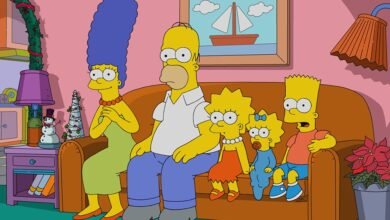Radu Jude on How Filmmakers Need to Be ‘Serious About TikTok’

Romanian director Radu Jude thinks it’s time for filmmakers to start taking TikTok seriously. During an in-conversation event at the International Documentary Film Festival Amsterdam, Jude pulled out his smartphone and showed a series of TikToks to the audience, saying, “To me, TikTok is like the beginning of cinema. It’s like Lumiére. Filmmakers are in trouble because this is ahead of us. If you are serious about filmmaking, you have to be serious about [TikTok].”
This conclusion came after IDFA’s artistic director Orwa Nyrabia, who moderated the conversation, highlighted the connecting threads within Jude’s oeuvre. To this, Jude said some artists are “very conscious” about their bodies of work and there are those who “make films without thinking about what connects them, and I feel I belong to this [group].”
“It’s greediness. I feel very greedy because I want to make everything,” he added. “I am preparing a film in France and am very scared but it’s a nice thing to do, not to think if the film will be good or be accepted in Berlin, Cannes… I have this greediness to try. I want to make documentaries. I have used AI-generated images in a film about Dracula I shot last year and chose the worst ones. Cinema to me is everything.”
Jude’s conversation followed a double-bill screening of his two most recent films, “Sleep #2” and “Eight Postcards From Utopia.” The former is an impressionistic collage of live streams from Andy Warhol’s grave on the webcam network Earthcam and the latter, co-directed with philosopher Christian Ferencz-Flatz, consists of dozens of Romanian commercials made as the country transitioned from socialism to a capitalist democracy.
“In my culture, making films was considered extremely difficult, expensive and full of rules – written and non-written. Distribution is still a problem, you either have commercial distribution or you have to make it at festivals. All of this creates a tense, castrating climate,” Jude said. “I discovered Warhol seven years ago and became obsessed with his filmmaking. His films are complex, his filmography is rich and unknown. I had to see [his films] pirated because it was the only access I had to his work.”
The director added that Warhol is the only artist who answered the question of how to make films by saying “You take a camera, push a button and you have a film.” “The man is right, filmmaking could be that. It started with that and it became more complicated and full of pressure of all kinds. But if you take a step back you find out that Warhol is right.”
Jude considers “Sleep #2” to be a “footnote” to Warhol’s classic 1964 film “Sleep,” consisting of looped footage of the American artist’s lover John Giorno while asleep. The initial idea came from a “joke” Jude made when he first found out about the webcam. “Warhol made ‘Sleep’ and now there was his eternal sleep. I feel a bit embarrassed that several of my films started as jokes — and not necessarily good ones — but a joke starts a train of thought.”
“I think [‘Sleep #2’] is one of the best things I made. It’s an impressionistic film and I find a lot of ideas about what cinema can be, the nature of images and surveillance [through making the film],” he said, adding that these questions feel “trivial” considering “what is happening in the world today.” Jude also mentioned how “Sleep #2” explored the elasticity of filmmaking by becoming his first-ever American film without him “ever putting a foot in America.”
Of “Eight Postcards From Utopia,” Jude said he called Ferencz-Flatz “because I wasn’t sure I could structure this film and he had written about advertisement. We knew we were going to make a film about the present history but it was historical. It’s funny and painful to see how naive everybody was.”
The director said the period following the Romanian revolution was “not only a time of political and social turmoil but also an opening of the country to other cultures and how I discovered cinema.” This era in the country ignited a lifelong love of history within the filmmaker, who said the period instigated a general “interest in where our society came from.”
“I remember my father coming home, he worked for a state company that had been privatized, and he had a sheet of paper because everybody who worked there received shares. Then the company collapsed. It was worth zero. The whole nation was fooled like that. Advertising is a way of instrumentalizing the hopes of people so this is a film about the hopes there were.”
Still, Jude said that not everything that happened in Romania after the shock of the 90s was bad. The director highlighted the country joining the EU as “an important step” that remains vital today despite the growing spirit of “sovereignty” he recognizes in Europe and the world. “I think it comes from Trump and [this idea of] America first, make America great again.”
The Romanian filmmaker said that he believes it’s important that “films deal with things that don’t work well” and that “a camera is there to show something that is not perfect.”
“I am always asked why I am anti-Romania or why I don’t show the good side. My only answer is that the only possibility [of filmmaking] is to show where things went wrong,” said Jude, before concluding that, to him, “the only reason to make films about history is if there is a relation to the present.”
Source link



